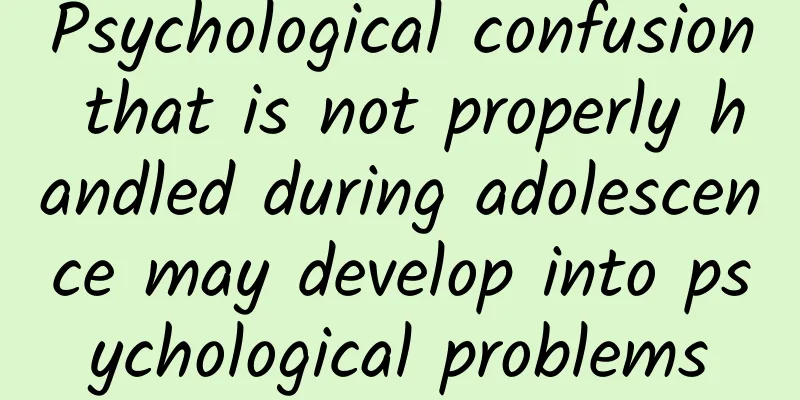Psychological confusion that is not properly handled during adolescence may develop into psychological problems

|
Author: Tang Qin, Researcher of Chinese Medical Association Reviewer: Qian Ying, deputy chief physician, Peking University Sixth Hospital Adolescence is an important turning point in children's growth. They will experience a lot of growth and changes during this period, gradually moving from ignorance to maturity. Inevitably, children will be confused about these changes they have experienced, and parents and teachers need to help them avoid psychological problems. Common psychological problems in adolescence can be divided into normal psychological confusion and abnormal psychological problems. 1. Common psychological confusions during adolescence Based on the child's growth and development, normal psychological confusion can be divided into the following three categories. The first category is confusion related to sexual maturity . Puberty generally occurs between 10 and 18 years old for girls and 12 to 20 years old for boys. It is an important period for physical and mental development. During this period, a series of changes will occur in the child's body, including the appearance of secondary sexual characteristics and other physical changes. For children, these changes are new and full of questions and confusion. If they do not receive correct and adequate education and guidance, it will be difficult for children to accept these changes. The second type is the confusion of the contradiction between dependence on authority and desire for autonomy and independence . On the one hand, adolescent children are not fully developed psychologically, and they are still psychologically dependent on their parents, teachers and elders; on the other hand, as they grow older and their bodies change, adolescent children also realize that they are growing up slowly, and they can make many decisions on their own and have a sense of independence. At this time, children will have a contradictory mentality of needing to rely on their parents and elders, but also wanting to get out of their "control". Therefore, there will be a lot of confusion about what they should do, and they need to be guided correctly. The third category is the confusion in getting along with peers . In interpersonal relationships, adolescence is at a stage where self-worth is determined through evaluation by others, and children need to gain recognition and affirmation from others in the group. Adolescents care a lot about their image in the eyes of their peers, and they hope that their performance will be liked by others. But after all, they are still children, and they are relatively more concerned about themselves. They do not have much experience in how to get along with others in a friendly manner, and they cannot be at ease in interpersonal communication. In addition, premature love is one of the problems that cannot be avoided in adolescence. Their own ignorance of feelings and their parents' opposition will cause them a lot of confusion and confusion. Therefore, on the one hand, adolescent children want to gain the attention and recognition of others, but on the other hand, they do not know how to get along with others properly. This will cause them to encounter setbacks in interpersonal communication, and they are in great need of guidance from their elders. Figure 1 Copyright image, no permission to reprint 2. Abnormal psychological problems and their impact during adolescence The psychology of adolescent children is complex. If the psychological confusion they encounter is not handled properly, they may develop the following psychological problems that are on the verge of pathology. • Insomnia and dreaminess, poor sleep quality . When children encounter psychological problems that they cannot solve, and cannot find the right person to ask for help, or do not have the right way to relieve them, they will think about these problems repeatedly, thus affecting their sleep. Over time, this will have a negative impact on the child's physical health. • Loss of appetite or even eating disorders . When some adolescents encounter problems that they cannot solve, they may suffer from eating disorders such as loss of appetite or overeating. This can lead to eating disorders and malnutrition in children, which can affect their physical health and even their normal life. • Unexplained headaches, nausea and other physical symptoms . Some adolescent children may experience anxiety for some reason and may also experience unexplained headaches, nausea, palpitations and other physical symptoms. • Bad temper or low mood . In addition to the above physiological reactions, some adolescent children may have sudden emotions, such as sudden anger or inexplicable sadness, which need to attract the attention of parents and teachers. Figure 2 Copyright image, no permission to reprint How to deal with adolescent psychological problems When adolescent children experience the above-mentioned psychological confusion or borderline psychological problems, how should we help them cope? The first thing is to distinguish the severity of these problems. Problems of different severity have different ways of coping. There should be a relatively obvious criterion for distinction, that is, the duration of the psychological problem. If the above phenomenon lasts for a short time and the child can adjust by himself, there is no need to worry; if the child has insomnia and other conditions for more than 2 weeks, or is always in a bad mood and has various physical discomforts for which no cause can be found for more than 3 months, you need to seek help from professionals. Because insomnia, unexplained physical discomfort, and bad mood are often early manifestations of psychological problems or psychological disorders such as anxiety and depression, professional judgments need to be made by professionals. In short, psychological problems can be regarded as psychological "colds". If they are mild, you can rely on self-regulation to recover and you will be cured without taking medicine. If they are serious, you must receive symptomatic treatment, otherwise the consequences will be serious and even life-threatening. Therefore, if you find that your adolescent child has psychological problems, especially abnormal psychological problems, you must seek help from professionals and conduct timely examinations and assessments. If the problem is not serious, professionals will tell you some self-regulation methods; if the problem is serious, you can also help your child recover through various methods such as medication, psychotherapy, physical therapy, etc. It should be noted that the earlier the problem occurs, the better the treatment effect. Figure 3 Copyright image, no permission to reprint In modern society, people are paying more and more attention to mental health. Adolescents are in a special period of growth and need to pay more attention to their mental health. If you find that your child has the above confusion, you should help them deal with it in time; if you can't solve it, you must seek help from professionals in time to avoid more and more serious psychological problems. |
Recommend
The harm of silicone breast augmentation turns out to be these three points
Silicone breast augmentation is a popular breast ...
Ten common misunderstandings about vaginitis that you may not know
Content from : Gu Zhuowei Shanghai Renji Hospital...
Why should we drink enzymes? How to choose enzymes?
Good enzymes should have the fragrance of plants,...
Can I eat eggs if I have mastitis?
Women should not think that only diseases in the ...
What is the reason why women lose their hair?
Many people frequently experience hair loss and a...
Is it okay for pregnant women to use mosquito coils occasionally?
As summer arrives and the weather becomes hotter,...
In addition to the "three mores and one less" what other complications of diabetes are there?
In addition to the "three mores and one less...
Where can I get relief from menstrual pain massage?
Many female friends will have some diseases durin...
Woman's fever rectal temperature
When a person is sick or has a cold, there is a c...
Why do women urinate blood?
People usually panic when they have hematuria. Af...
After the abortion, it was still not clean and bleeding again after 28 days
Medical abortion has many advantages over surgica...
Diet therapy for hair loss on the top of girls' heads
Hair loss is very common. Many people have experi...
What are the causes of non-menstrual bleeding?
If female friends experience bleeding symptoms du...









